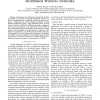Free Online Productivity Tools
i2Speak
i2Symbol
i2OCR
iTex2Img
iWeb2Print
iWeb2Shot
i2Type
iPdf2Split
iPdf2Merge
i2Bopomofo
i2Arabic
i2Style
i2Image
i2PDF
iLatex2Rtf
Sci2ools
113
click to vote
ICC
2008
IEEE
2008
IEEE
Performance of ALOHA and CSMA in Spatially Distributed Wireless Networks
—In this paper the performance of unslotted ALOHA and CSMA are analyzed in spatially distributed wireless networks. Users/packets arrive randomly in space and time according to a Poisson process, and are thereby transmitted to their intended destinations using a fully-distributed MAC protocol (either ALOHA or CSMA). An SINR-based model is considered, and a packet transmission is successful if the received SINR is above a threshold value for the duration of the packet. Accurate bounds to the probability of outage, which is a function of the density of transmissions, are developed for both MAC protocols. These bounds are used to evaluate the performances of ALOHA and CSMA, and to gain insight into the design of general MAC protocols for ad hoc networks. Moreover, CSMA with receiversensing is proposed to improve the performance of CSMA.
Related Content
| Added | 30 May 2010 |
| Updated | 30 May 2010 |
| Type | Conference |
| Year | 2008 |
| Where | ICC |
| Authors | Mariam Kaynia, Nihar Jindal |
Comments (0)

